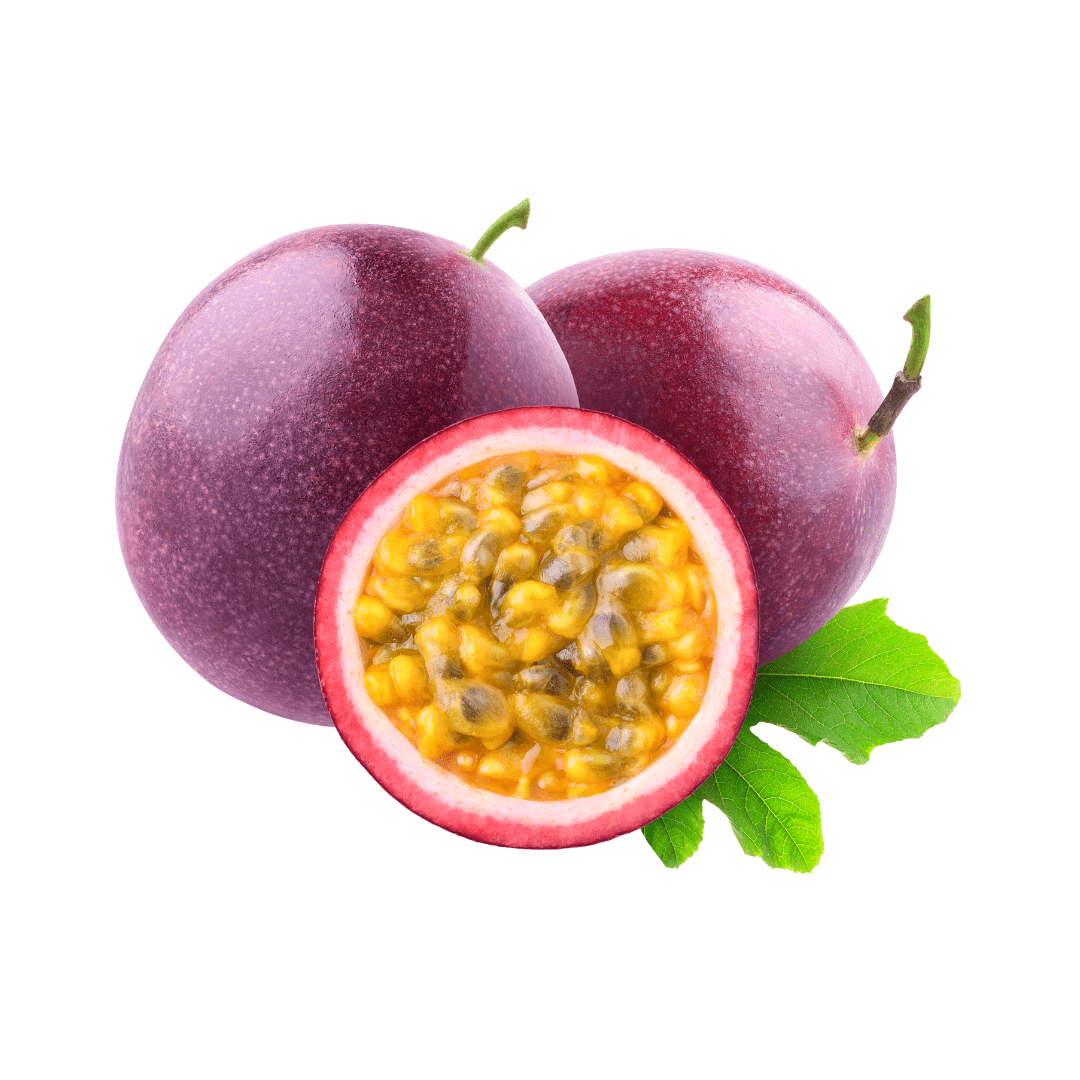About
Passionfruit is a tropical fruit that comes from the Passiflora vine. It has a tough outer shell that protects a soft, juicy interior filled with seeds. Passionfruit is known for its distinct sweet and tart flavor, and it can be eaten raw, juiced, or used in a variety of recipes.
Health Benefits of Passionfruit:
-
Rich in Antioxidants: Passionfruit is a great source of antioxidants, which can help protect the body from harmful free radicals that can cause cell damage.
-
Good for Digestion: Passionfruit is high in fiber, which can help regulate digestion and prevent constipation.
-
Boosts Immune System: The fruit is a good source of vitamin C, which is essential for a healthy immune system.
-
Anti-inflammatory Properties: Passionfruit contains several compounds that have anti-inflammatory properties, which can help reduce inflammation throughout the body.
-
Lowers Blood Pressure: Passionfruit is rich in potassium, which can help lower blood pressure and reduce the risk of heart disease.
-
May Improve Sleep: The fruit contains a compound called Harman, which has been shown to have sedative effects and may help improve sleep.
Diseases that Passionfruit can help prevent or manage:
- Heart Disease
- High Blood Pressure
- Type 2 Diabetes
- Digestive Issues
- Inflammation
- Insomnia
Nutritional Information:
Energy: 38 calories
Macro Nutrients:
| Nutrient | Amount per serving (50g) |
|---|---|
| Carbohydrates | 8.5g |
| Fats | 0.4g |
| Proteins | 0.9g |
| Fiber | 2.2g |
| Water | 36.8g |
Vitamins:
| Vitamin | Amount per serving (50g) |
|---|---|
| Vitamin A | 66.5 IU |
| Vitamin B1 (Thiamine) | 0.02 mg |
| Vitamin B2 (Riboflavin) | 0.02 mg |
| Vitamin B3 (Niacin) | 0.5 mg |
| Vitamin B6 | 0.04 mg |
| Vitamin B12 | 0 mcg |
| Vitamin C | 12.4 mg |
| Vitamin D | 0 mcg |
| Vitamin E | 0.5 mg |
| Vitamin K | 0.7 mcg |
| Folate | 16.3 mcg |
| Biotin | 0.2 mcg |
Minerals:
| Mineral | Amount per serving (50g) |
|---|---|
| Calcium | 4.5 mg |
| Iron | 0.4 mg |
| Iodine | 0 mcg |
| Zinc | 0.2 mg |
| Magnesium | 8.5 mg |
| Phosphorus | 18.5 mg |
| Potassium | 128.5 mg |
| Sodium | 1.5 mg |
| Chloride | 5.5 mg |
| Copper | 0.1 mg |
| Chromium | 0 mcg |
| Fluoride | 0 mcg |
| Molybdenum | 0 mcg |
| Manganese | 0.1 mg |
| Selenium | 0.3 mcg |
What is passionfruit and where does it come from?
Passionfruit is a tropical fruit that comes from the Passiflora vine, native to South America.
How does passionfruit taste like?
Passionfruit has a distinct sweet and tart flavor that is both refreshing and unique.
Can passionfruit be eaten raw?
Yes, passionfruit can be eaten raw by cutting it open and scooping out the soft flesh and seeds.
What are the health benefits of passionfruit?
Passionfruit is rich in antioxidants, fiber, and vitamin C, which can benefit heart health, digestion, and the immune system.
How can I incorporate passionfruit into my diet?
Passionfruit can be used in smoothies, desserts, salads, or as a topping for yogurt or ice cream.
Does passionfruit have any anti-inflammatory properties?
Yes, passionfruit contains compounds that have anti-inflammatory properties, which can help reduce inflammation in the body.
Is passionfruit good for heart health?
Yes, passionfruit is rich in potassium, which can help lower blood pressure and reduce the risk of heart disease.
Is passionfruit suitable for those with diabetes?
Passionfruit can be included in a balanced diet for individuals with diabetes but should be consumed in moderation due to its natural sugar content.
What nutrients does passionfruit contain?
Passionfruit is a good source of vitamins A, C, B-complex, and minerals like potassium and magnesium.
Is passionfruit safe during pregnancy?
In moderation, passionfruit is safe to consume during pregnancy and can provide essential nutrients.
How can I choose a ripe passionfruit?
Look for passionfruits with wrinkled and slightly soft skins, as they indicate ripeness.
Are there any allergic reactions associated with passionfruit?
Some individuals may be allergic to passionfruit, so it's essential to watch for any adverse reactions.
What are the different varieties of passionfruit?
There are several varieties of passionfruit, including purple and yellow passionfruit, each with slight taste differences.
Can passionfruit be juiced?
Yes, passionfruit can be juiced to make refreshing and nutritious drinks.
How should I store passionfruit?
Store ripe passionfruit in the refrigerator, while unripe ones can be kept at room temperature to ripen.
Does passionfruit have any culinary uses in savory dishes?
Yes, passionfruit can add a unique flavor to savory dishes like salads or dressings.
Are there any culinary traditions associated with passionfruit?
Passionfruit is used in various traditional dishes and beverages in tropical regions worldwide.









